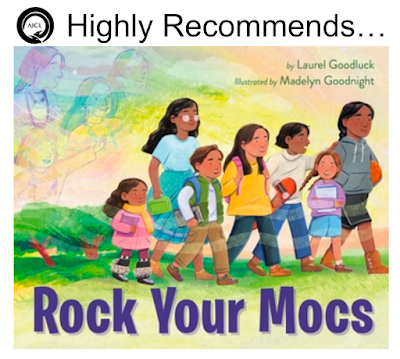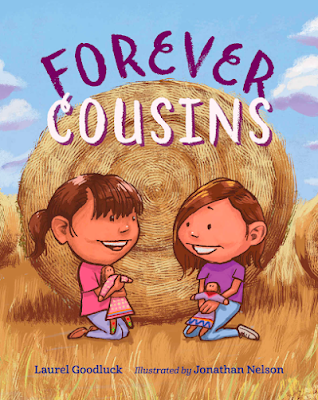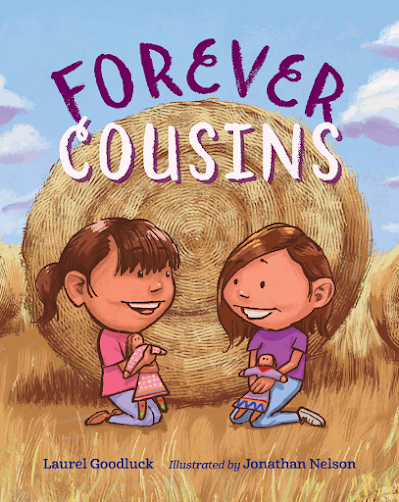HIGHLY RECOMMENDED!
Forever Cousins
Written by Laurel Goodluck (Mandan, Hidatsa and Tsimshian member)
Illustrated by Jonathan Nelson (Diné)
Published by Charlesbridge
Publication Year: 2022
Reviewer: Debbie Reese
Status: Highly Recommended
****
As I turned the pages of Forever Cousins, I thought back to the early 1990s when we left Nambé's reservation to go to graduate school in Illinois. Our daughter was three years old. She and her cousins were in tears. The always-present playing options were about to change.
When you start reading Forever Cousins, you'll meet Amanda and Kara and to a lesser degree, Forrest. You'll learn a lot about them. The two girls are together all the time. Sometimes they're doing things most kids in the U.S. do--like make jelly sandwiches--and sometimes they're doing something Native kids do, like dancing at a powwow. On the cover you see both girls have dolls. Those are quite special! They were made for them by their magúu (the author's note tells us that magúu is a Hidatsa word that means grandmother).
We learn that they live in a city and that Kara and her family are moving from the city to the Rez. They'll see each other in a year. A year! In subsequent pages we see the two, both feeling alone while doing the same activity. Amanda is at a powwow in the city (we see tall buildings in the background), holding her doll close as she sits on a folding chair. Kara is at a powwow on the Rez (we see low hills in the background). Her mom offers her some fry bread but she just hugs her doll and shakes her head.
Throughout, Nelson's illustrations set the story very much in the present day. That's especially evident on the page where the two girls talk to each other using a video platform on their cell phones. Like anyone, we use all the forms of literacy and communication available to us! I like that but I also like the page where Amanda gets a post card from Kara. Finally it is time for Amanda and her family to hit the road! It'll take two days to get to the Rez. Nelson shows us their joy when they cross a state border. That made me smile. When we drove from Illinois to Nambé, we'd cheer just like that when we crossed from Texas into New Mexico!
Amanda and her family arrive at the reunion, and after some initial shyness, the cousins have a great time and we see the families gathered while a new baby gets his Hidatsa name. It is then time to say their goodbye's.
The story Goodluck and Nelson share in the pages of Forever Cousins is a joy to read and look at. Like the recent books by Native writers, it has an extensive Author's Note that provides teachers with information that helps them understand why Amanda and Kara and their families aren't on the reservation when the story starts. In her note, Goodluck says that the characters in her book represent her and her cousins growing up in the 1960s and 1970s in the Bay Area suburbs of California. She shares some background about her family and cousins and how the city and the Rez were both home and community. She says:
As a matter of fact, we are dual citizens: first enrolled members of sovereign Tribal Nations and then citizens of the United States. The term "sovereign nation" means a Tribal Nation that governs itself. If it is federally recognized, then it has a governmental relationship with the United States as a nation with a nation.
Those of you who know me probably guess that my heart is soaring as I read those sentences! Teachers: download
Affirming Indigenous Sovereignty: A Civics Inquiry by Sarah B. Shear, Leilani Sabsazlian, and Lisa Brown Buchanan. It'll provide you with ideas on how you can incorporate tribal sovereignty into your classroom.
In the portion of her note titled "From the Reservation to the City" she tells us that her parents moved from their reservation to the city because of the Indian Relocation Act of 1956. It was a federal program that was described as a way for Native people to move to cities and get vocational job training--but there was more to it than that. Goodluck writes:
In actuality, the federal government wanted to erase Native culture by moving Native people to cities so they would adapt to the lifestyles of white people.
I am so glad to see that sentence in this book! This is the honesty that ought to be in every book!
She goes on to say that her parents were able to get jobs in the city, but that the government promise of a job did not work for most tribal people. They endured discrimination and racism. I have uncles and aunts who moved to cities for jobs. Some got those jobs and stayed in those cities, others came back very soon. I suggest you read
Indian No More because it, too, is about this relocation program.
I'm sharing the final paragraph in the note because it is so very powerful:
The treatment of Native Americans in the United States was and sometimes still is despicable. But as with the family in this story and with my own family, unjust experiences forge tight bonds between us and make us strong. Our resiliency is rooted in our ceremonies and culture. We have a deep love of home. The land reminds us of our ancestors, storytelling helps us make good decisions, and we continue to have love and loyal family connections that are unbreakable.
Forever Cousins is tribally specific. Both, the author and illustrator, are Native. The story is set in the present day. It can--and should be--read year-round (not confined to a heritage month or day). It is getting a 'highly recommended' label from me, but my enthusiasm for the book is much more than a 'highly recommended' label conveys. With this story and the note, Goodluck and Nelson give teachers or parents information that they can carry with them when they close this book and choose another one that features Native people. They see us as people who live in a city or on a reservation. They can see us as people whose identities and lives as Native people are central to who we are, and who share the same sorts of joys and fears that kids of other cultures do, too.
Forever Cousins is one of the best books I've read. I'm delighted to read it, to write about it, and to recommend it to everyone.






















